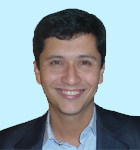Valuing our people
Developing our talent
The people we hire are passionate about education, information and entertainment, and they tend to have ambition and aspirations to progress through or across our businesses. Pearson is fortunate to have a great deal of talented people at every level of our company and we strive to identify, nurture and promote the min a number of ways. We encourage people to have regular career discussions with their manager, we conduct annual performance reviews, we support internal and external training opportunities, and we promote mentoring, in addition to our own cross-Pearson initiatives to prepare future leaders and keep the current senior team fresh and switched on. Our talent management programme highlights where it may be beneficial to move people because of their job or skills, and we have the in-house expertise to help the transition go as smoothly as possible. Of our senior management group, around 20% have experience in at least two Pearson operating companies.
Activity summary
We held our annual Forum in New York in 2008, bringing together over 100 of our most high potential managers from all over the world for a three-day session with the Pearson Management Committee and other senior managers. We are launching the Emerging Leaders Programme for Forum alumni in 2009, which will provide ongoing support for these potential future leaders.
A small team of senior managers visited our new businesses in the United Arab Emirates, meeting with local government officials, education institutions, companies and authors to develop professional relationships and gain a better insight into this emerging market.
As part of the annual talent review, Marjorie Scardino discussed with the head of each business and function across Pearson the groups of people who may one day lead a significant part of the company.
Snapshots
FT e-learning zone The FT's new, interactive web-based learning and resource centre went live in 2008, featuring over 30 online courses exclusively for staff to use.
We invited submissions to the third year of our Pearson Innovation Fund, a fund available to assist Pearson companies around the world to invest in international projects that develop new technologies and new business models, with a particular focus on ones that use digital distribution channels. Projects partially or wholly funded in 2007/08 included Penguin's wetellstories.com, the FT Group’s Chinese language FTWealthmagazine, FT Rui, and the design and piloting of a single digital platform for remediation in math and reading/study skills at Pearson Education, to help reduce time spent in developmental studies.

The turnover of our movers and shakers – a group of some of the most able people in the company – is much lower than the average turnover in the rest of Pearson and has consistently declined over the last three years.
Focus on: INTER-COMPANY INITIATIVES
We have mentoring programmes across the company, some more formal than others, but we've found that mentoring is a highly effective way to connect people in different parts of the business. As with the short-term assignments we enable through our NewDirections programme, both sides of the partnership are able to gain insight into sometimes previously undiscovered parts of the organisation, growing each other's skills and raising aspirations. Two examples of these are below:
Mentoring: A number of successful relationships were formed across the finance teams of different operating companies in 2008. One such example involved a mentee presented with the prospect of redundancy and the need for redeployment. The mentor worked with the mentee throughout this time, providing information on the Pearson businesses and types of roles the mentee could consider, plus a network of contacts in the Finance department. The mentor offered support throughout the job search process and the mentee was successful in moving across the company to another suitable role.
New Directions: A designer from Pearson Curriculum Chicago spent two weeks with Maskew Miller Longman in South Africa in March 2008. The purpose of the visit was to share best practice for product development and work with the design team in South Africa. This experience helped him to develop an operational network and understand the challenges and opportunities faced by MML in the South African market. A reciprocal visit is being considered for the future.
FAST FACTS
We've identified at least one 'ready-now' and one 'ready soon' successor for each of the top roles across Pearson: although we may sometimes choose to look externally to get fresh eyes on an old problem or bring in specific skills, we know we always have people to step into the key Pearson roles if required.
A few words from… Paulo Pisano
"When I joined Pearson in October 2008, I soon noticed some remarkable features about the culture.
One was that a lot of people seem to be studying for something or learning a new skill – perhaps a welcome side effect of being surrounded by information. Another was that there is a healthy level of competition and cooperation between different parts of the business, which seems to drive our designers and sales people to really take note of what’s happening in their part of the world and be the best in their field.
But I think the most striking distinction was that people here are genuinely aware of the power they have in their jobs to make the world a better place. I think that there's a real culture of valuing the contribution of each person at Pearson, and it has an effect on how our people view their own capacity to influence positive change. They know they are capable, innovative and valued people because we work hard to treat them as such, and that's why they are able to produce such fantastic results for Pearson."

Paulo Pisano Director, Human Resources,
Pearson Education International
- Privacy statement
- Disclaimer
- Accessibility
- Site map
- © 2009 Pearson plc
